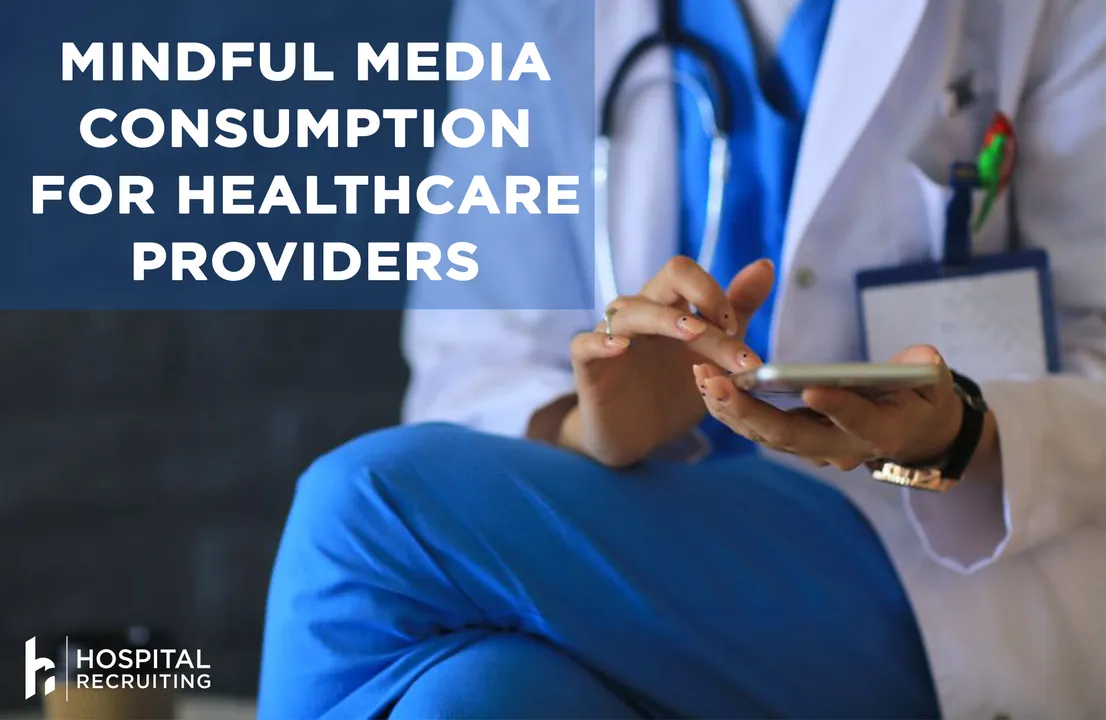Mindful Media Intake for Healthcare Providers

Counseling people on the topic of mindful media intake is tricky for a number of reasons, because at each end of the spectrum lie extreme options: to forgo watching the news at all and resort to a uninformed, hermit life, or being so inundated and up-to-date on world news that you collapse in a ball of anxiety and dread. When deciding for yourself what your healthy dose of media should be, I would consider the following: your values and social responsibility.
5 Methods for Mastering Media Intake
1. Once a year, evaluate your behavioral patterns to ensure your actions align with your values. For example, some of my values include my overall health, relationships, creativity, trust, mindfulness, minimalism, and gratitude. I then balance my values with my moral, social, and ethical responsibility as a physician. I chose this profession, and therefore I am not granted the luxury of checking out. Wherever you are in life, you have an environmental, ethical, philanthropic, and economic responsibility to the world. To deny these leads to a difficult, isolated, and unfulfilled life. As a follower of the online personalities the Minimalists, I really like this guide to identify your values (scroll to halfway down the page).
2. Once you have a good sense of your values, and what actions you ought to take to honor your level of social responsibility, you can then evaluate when, how, why, and where you choose to consume media output. In the same way overeating sugar will ultimately lead to diabetes, unhealthy, unfiltered consumption of the media will lead to disease. If you value peace and quiet but have the TV on all day (especially for the kids), then consider only turning it on to watch a few select programs.
3. Mindfully notice that we have a proclivity toward negative stories. As providers, because we see death and disease much more frequently than the rest of the population, we inherently develop a bias that believes the incidence and prevalence of said diseases occur more often than what is true. You’re much more likely to click on or watch a calamity than a story with a happy ending. Psychologically, we’re programmed to constantly filter incoming stimuli for threats, and unconsciously, we gravitate to this; it’s a survival mechanism. Media outlets present a filtered version of news with an adulterated political and economic agenda. By broadcasting the horrors of the pandemic, for example, media stations ensure that you’ll return each day to watch more news. Even when the pandemic starts to eventually resolve - which based on historical pandemics it will someday - the media will always preface this with disdain and pivot to a tone of negative skepticism so that it keeps you on the edge of your seat.
4. Choose one time a day, for a set amount of time, that you will review a few select, reputable news sources. With smart watches, phones, TVs, and computers, we currently drown in notifications and essentially drink from a fire hydrant of information. When you feel yourself becoming overwhelmed, or on the verge of a panic attack, I advise that you take a few days away from all technology and media. Technology has advanced so rapidly in the last 10 years; biologically, we have not evolved at the same rate to tolerate this level of constant stimulation and input.
5. Eliminate as many advertisements as you can. Social media and web browsers collect, store, sell, and share all your information: what you like, what you don’t like, what you purchased yesterday, where you drove, what you’re thinking about purchasing. We mistake ads as being free and benign, but they steal your attention and time. Advertisements fall into the category of media intake, something that also inherently triggers our stress response. Consider using software that blocks the collection of your information, like Duck Duck Go.
In conclusion, to mindfully absorb the media, make a list of your values and ensure your actions align with this list. I promise after a few days of removing the notifications, screens, and thoughtfully choosing your media, you’ll notice an immediate relief
Related Posts
